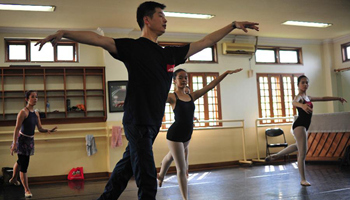By Xinhua special correspondent Chen Dong
ABOARD TIANGONG-2, Oct. 31 (Xinhua) -- Today is Oct. 30, my 12th day on board Tiangong-2. I am Xinhua space correspondent Chen Dong.
I would like to tell you about our in-orbit gravity-free cardiovascular experiments, or as we call the whole process the "CDS experiment," which track changes to our bodies while we are in orbit.
The CDS device features an electrocardiograph (ECG) wire that has four leads attached to our bodies. It measures things like our heart rate and blood pressure. The device that measures our blood pressure is put onto our arms just like how a ground-based doctor would measure a patient's blood pressure. In addition, there is a sensor used to measure respiration. It is wrapped in a black bag, and we hang it from our necks to measure our chest breathing and belly breathing.
There is also another, fairly-curious, instrument, which I am sure many of you may not have heard of. It is called a laser Doppler device. This device measures the microcirculation of our blood vessels. As far as I know, this is the first time that China has tested it in space.
The biggest difference between a CDS experiment in space and one on the ground is ultrasound. Under zero gravity our organs are slightly displaced. As a result, organs that are usually easy to find on Earth are much more difficult to locate when in space. We have to be aware of this and move the wires accordingly.
The data we are generating and reviewing are primarily used to monitor the difference between our body indexes up here and on Earth: we are trying to find out which ones change and do not. This precious data will be analyzed further by ground staff and will give a clearer picture of the subtle changes that occur in a gravity-free environment. ` I would like to share an interesting discovery: Normally, on Earth, we only have one artery in (either side of) our necks. But there are two in space. Earlier in the mission I misidentified the blood vessel, because the vein besides our artery becomes thicker in space.
There are many things that I had assumed before coming up here that have proven to be wrong. For example, I had imagined that I would have a rather complete, round, bright view of Earth, with the expansive, darkness of space in the background. In fact, we are not far enough away for this -- so from the porthole, I just see part of Earth.
Another discovery, for me, is my new-found almost super human strength, I can maneuver heavy items much easier up here than on Earth. For example, a very heavy piece of equipment on the Earth may need two or three people to carry and install onto the wall of the capsule. But in space, by gently using one hand or two fingers, I can move it as I wish. While I feel that my strength has increased all of a sudden because of being in space -- that is, sadly, not the case. In fact, it is the items that have lost weight. I think that in space it would be easy to break all sorts of weightlifting world records.
I have only lived in space for less than a fortnight and I am still learning. I hope, my friends, to share all these new experiences with you.










